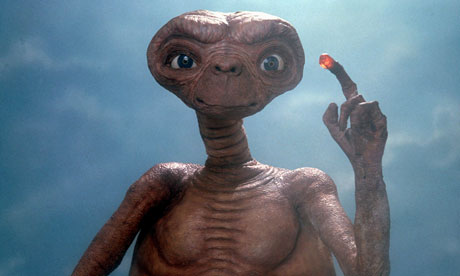The late astronomer Carl Sagan, in a Planetary Society debate with Mayr (Bioastronomy News, Vol. 7, No. 4, 1995), noted that technologically communicating species “may live on the land or in the sea or air. They may have unimaginable chemistries, shapes, sizes, colors, appendages and opinions. We are not requiring that they follow the particular route that led to the evolution of humans. There may be many different evolutionary pathways, each unlikely, but the sum of the number of pathways to intelligence may nevertheless be quite substantial.”

When we view the grossly overweight or anorexic, we are repelled. When we see the deformed, we stare. You would scarcely know what to say or how to act to a pygmy suddenly seated in your suburban living room. An encounter with a sentient being who may appear utterly unlike you in very fundamental ways may bring out very fundamental fears and anxieties. Many people may simply not have the ability within their psyche to interact and communicate with a creature wholly out of range of their experience. How would one feel in front of a sentient and conversant creature whose size, bodily proportions, features and coloring are not even Homo sapien? Some would recoil. Others would be unable to focus to talk. All would be initially shocked or “jarred” – and few would be able to get over it.
If the visiting alien’s image (especially its facial features) and its countenance, carriage, mannerisms and dress were unpleasing to us or markedly different from our own- many of our own would reject it. Though some would be awed by their appearance, many would abhor it. They would experience angst, distress -and even uncontrollable aversion- based simply on looks alone. And this physical dissonance would be compounded if we were to view and interact with people who do not look like us and who are non-emotional (or who express emotion in ways in which we are unfamiliar.) Humans of course express their emotions on their faces.
And it could have even deeper adverse repercussions. Many would no doubt suffer from “future shock.” Future shock is a condition of physical distress and psychological disorientation which is brought on by the inability to cope with rapid or sudden change. Acknowledgement of the alien would necessarily mean that we must also acknowledge that there are those who are older than humankind, who are smarter and wiser than us, and who are more highly advanced on every technical level. They have already “been there and done that.” They are “better” than us. Our history is small and insignificant compared to theirs.
The Alien recognizes that the Human is historically unable to get along with other humans of other races, creeds, colors and countries. They see that we even find it difficult to deal with those of a different age group, gender or sexual identity. They see how we avoid those with physical or mental challenge. We build up inaccurate or even hateful mental images of those things to which we are not exposed, about those who are not like us. Sometimes we even demonize them.
Until we are proven able to “get along” as a human race, non-human races will not make open contact with us. They see that humans still cannot even understand each other- and that for that reason we would be entirely unable to understand the visiting alien. We are still dealing with the tremendous challenge of being human. We are not ready for non-humans. Until we change our inner selves, our outer world will forever be in conflict.
A “real” alien would be the Ultimate Immigrant. He would be viewed as not only “not from our country” – but not even from our own world. “Nationalism” is endemic to all countries today. It is an engrained ideological apparatus where citizens and the nation-state find common loyalties and identification. We have all cultivated a devotion to the interests and culture of the respective nations in which we live. “Ethnic Identity” is our shared heritage. It can be based on such things as ancestry, traditions, language or territory.
Both of these powerful concepts – nationalism and ethnic identity – contribute to our sense of belonging. But the alien does not “belong.” The alien does not fit any of our people’s sense of nationalism or of ethnic identity. The alien would not “fit in” to any existing professional, social, racial, legal, class or caste system. In fact it may well be that they do not share anything with us with which we are familiar. They would be distrusted. Many would find it difficult to cultivate a sense of kinship with them. How would you act towards a “stateless” person who does not have a past, an identity or any “ways of being” with which you can relate?
Nationalism and ethnic identity can lead to a “healthy pride.” But unchecked it can also lead to a negative view of other cultures. It can promote an “Us versus Them” attitude which would not welcome the visiting alien. One could envision the uprising of a “One Earth, One People” movement in the wake of the visiting alien.








